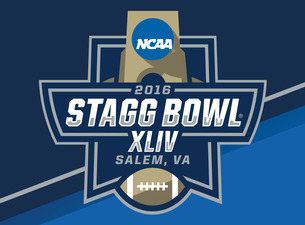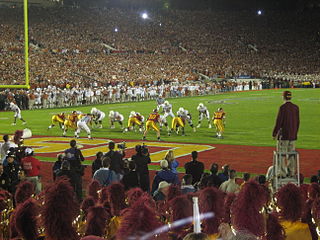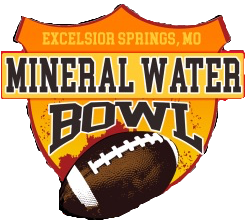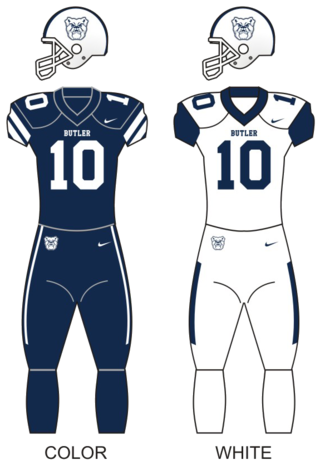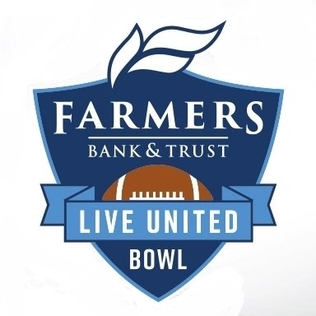Background
In 1956 the NCAA College Division was created to serve the athletic needs of the association's smaller member institutions. The division held separate championships in several sports, starting with a basketball tournament at the end of the 1956–57 season. In lieu of a football championship, the division eventually held four regional bowl games from 1964 through 1972, intended to crown the small-college "champions" of different parts of the country. [1] These included the Camellia Bowl for the West; the Grantland Rice Bowl for the Mideast; the Tangerine Bowl (1964–67), then the Boardwalk Bowl (1968–72) for the East; and the Pecan Bowl (1964–70), then the Pioneer Bowl (1971–72) for the Midwest.
In 1969, the NCAA created two more postseason games, the Amos Alonzo Stagg Bowl and the Knute Rockne Bowl, "for its College Division II schools, those 100-plus smallest schools in the NCAA." [2] Eligible schools were divided into an East Region (the Northeast and Middle Atlantic states) and West Region (the rest of the country), with the Stagg Bowl serving as the West championship and the Rockne Bowl as the East championship. At least for the sport of football, this accommodation foreshadowed the decision to subdivide the College Division four years later.
After the reorganization of the NCAA into the present three divisions (I, II, and III) in 1973, Division II and Division III began to conduct postseason football playoffs. The Amos Alonzo Stagg Bowl became the championship game for Division III, and the remaining active College Division bowls were incorporated into the Division II playoffs. The Boardwalk Bowl (1973) served as a quarterfinal game; the Grantland Rice Bowl (1973–77), Pioneer Bowl (1973–75), and Knute Rockne Bowl (1976–77) served as the semifinal games; and the Camellia Bowl (1973–75) and Pioneer Bowl (1976–77) were venues for the championship game. [3]
With the creation of Division I-AA (today's FCS) in 1978, the Pioneer Bowl became the I-AA title game. That autumn, the Division II championship was referred to as a "bowl" in some press accounts [4] but remained unnamed, and the practice of designating the semifinal games as bowls came to an end. The Zia Bowl hosted the championship in 1979 and 1980, then the Palm Bowl (former venue for the NAIA Football National Championship) hosted it from 1981 through 1985. The Palm Bowl folded after the 1985 contest, and for the next dozen years no Division II postseason game carried a bowl designation.
History (1997–present)
The current system of Division II bowl games has its origins in 1997, when a new Pioneer Bowl (unrelated to the former game) was created as a contest between teams from the division's two conferences of historically black colleges and universities (HBCUs), the Southern Intercollegiate Athletic Conference (SIAC) and the Central Intercollegiate Athletic Association. [5] The game moved among five southeastern US cities: first Atlanta, GA, then Mobile, AL, Columbia, SC, Charlotte, NC, and finally Columbus, GA. It was held annually until 2012, except for cancellations in 2002 and 2008. [6]
In 2000, the Mineral Water Bowl became the era's second Division II bowl game. The bowl, held in Excelsior Springs, MO, dated from 1948 (with interruptions) and had been a junior college postseason contest from 1992 to 1999. It included teams from the Northern Sun Intercollegiate Conference (NSIC) and Mid-America Intercollegiate Athletics Association (MIAA), an arrangement that continued through 2017, when it gave way to a matchup between an NSIC team and an at-large team. The game was cancelled in 2020 due to the COVID-19 pandemic and was never played again. [7]
Another former junior college postseason game, the Dixie Rotary Bowl in St. George, UT, became a Division II bowl in 2006, but only lasted three years. From 2006 through 2008, the Rocky Mountain Athletic Conference (RMAC) sent a team to the game; in 2007 and 2008, teams from the Great Northwest Athletic Conference (GNAC) provided the opponent. [8]
From 2009 through 2012, the short-lived Kanza Bowl matched teams from the MIAA and the Lone Star Conference (LSC). [9] The game was held in Topeka, KS.
From 2012 through 2018 (except for a cancellation in 2013), the C.H.A.M.P.S. Heart of Texas Bowl matched a team from the LSC against an at-large team. [10] The game was held in Copperas Cove, TX (2012–17), then Waco, TX (2018). It was played on a double bill with a junior college postseason game which remained active after 2018.
The Live United Texarkana Bowl, founded in 2013, features a team from the Great American Conference (GAC). Initially the opponent could come from either the MIAA or the LSC, [11] but since 2017 the game has been a GAC-MIAA matchup. It is held in Texarkana, AR.
The Heritage Bowl, founded in 2017, matches teams chosen from among the MIAA, LSC, and GAC. [12] The game is held in Corsicana, TX.
America's Crossroads Bowl, founded in 2019, matches teams from the Great Lakes Valley Conference (GLVC) and the Great Midwest Athletic Conference (G-MAC). [13] Formerly hosted by Hobart, IN (2019–22), the game is now held in Hammond, IN.
The Florida Beach Bowl, founded in 2023, revived the matchup of the defunct Pioneer Bowl by featuring HBCU teams from the CIAA and SIAC. [14] [15] The game is held in Fort Lauderdale, FL. [16]
No Division II bowls were played in 2020 due to the COVID-19 pandemic.
Since the onset of the current Division II bowl system, Tuskegee has the most appearances (ten) and most victories (seven) of any team, all in the Pioneer Bowl, largely because its traditional Turkey Day Classic against Alabama State extended its regular season to Thanksgiving Day, precluding participation in the Division II playoffs. Tuskegee thus was unique in choosing to go to a bowl game in several years when it would have qualified for the playoffs, if not for its Thanksgiving Day game. The most notable examples came in 2000 and again in 2007, when Tuskegee capped perfect 12–0 seasons with victories in the Pioneer Bowl.
On the conference level, teams from the MIAA have registered the greatest success, participating in the most bowls (5), the most games (36), and posting the most victories (26). The conference's most impressive year was 2017, when MIAA teams played in each of the four bowls then in existence and won all four games. Within the MIAA, Missouri Western has the most bowl appearances (nine) and most victories (six), in both cases second only to Tuskegee overall.
Thus far, teams from the remaining six Division II football-playing conferences—the Northeast-10 Conference (NE10), Pennsylvania State Athletic Conference (PSAC), South Atlantic Conference (SAC), Gulf South Conference (GSC), Great Lakes Intercollegiate Athletic Conference (GLIAC), and Mountain East Conference (MEC)—have not participated in Division II bowl games.



